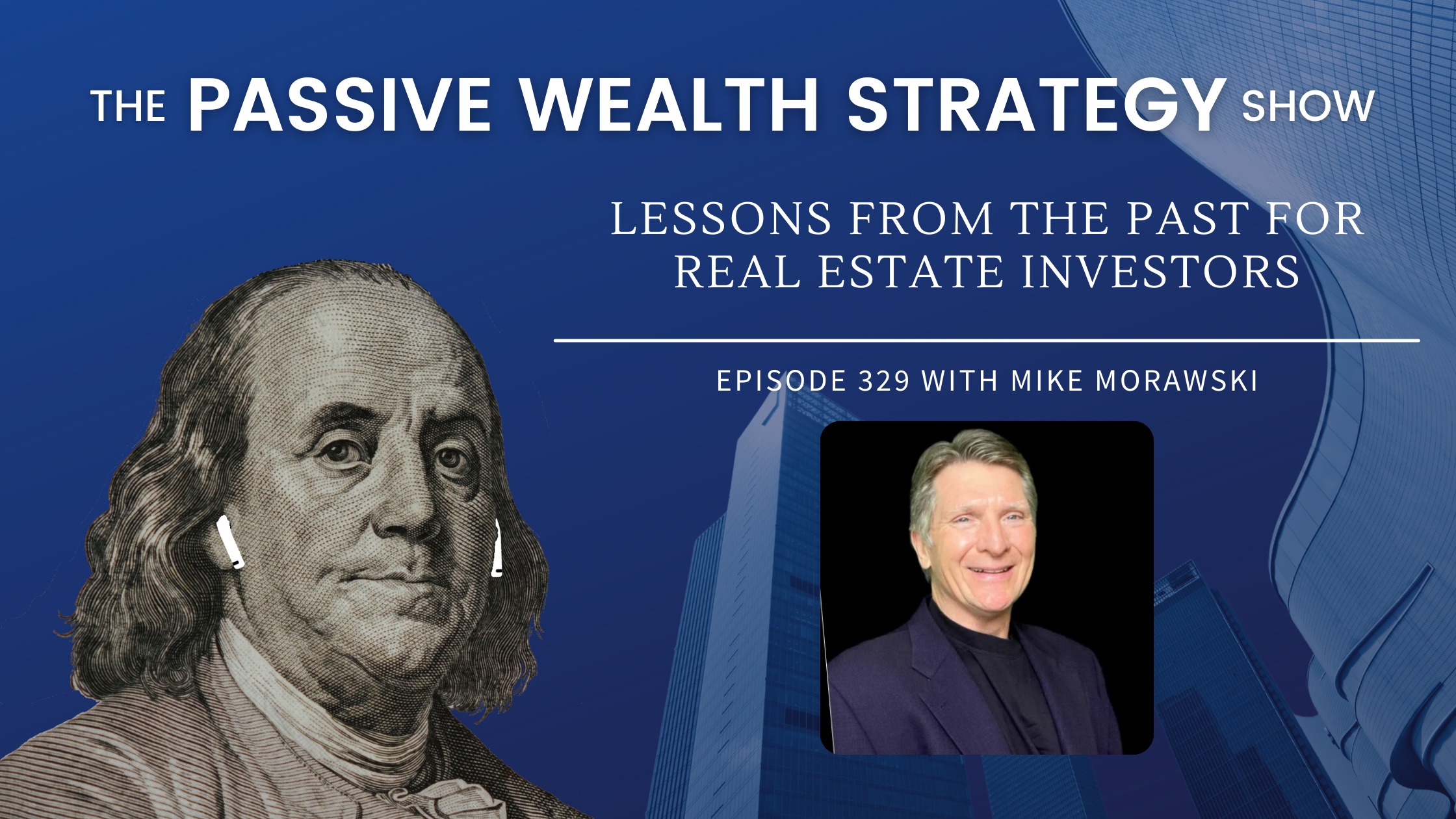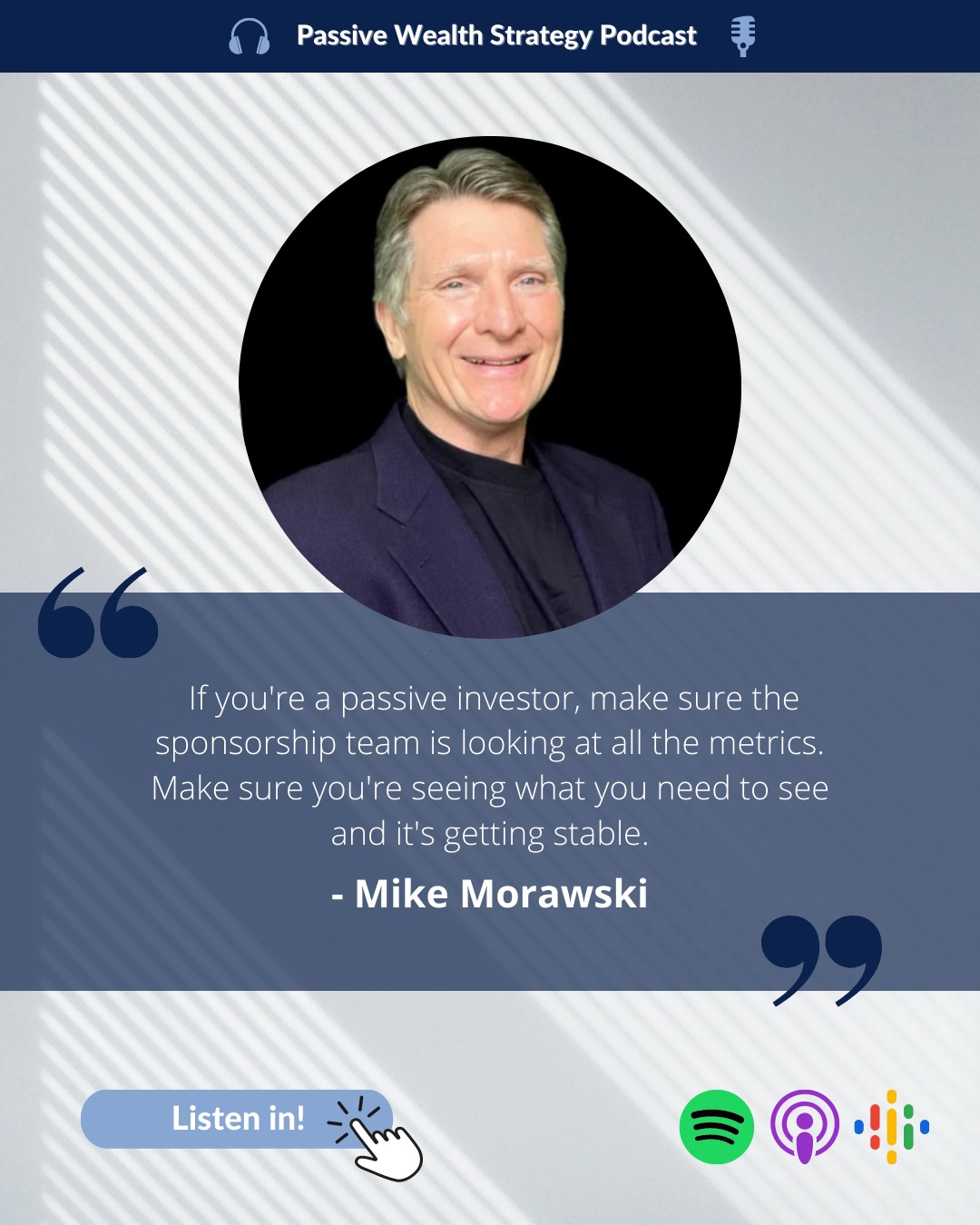
Lessons from the Past for Real Estate Investors with Mike Morawski
Mike, thank you for joining us today.
Hey, you’re welcome, Taylor. I appreciate you having me on I’m very honored. Thank you.
It’s been great talking with you so far and I’m a little kind of blown away by your story? And for our listeners out there who don’t know about your background, tell us about it.
So I’ve been in real estate for 30 years. I started to tell you that part of it. And my background started, I was in the construction business and had built a very successful residential, commercial construction company in the Northwest suburbs of Chicago. The problem was I was still involved in the business.
I was banging nails. I was sales. I was taking care of the bookkeeping. I was scheduling and it, my life, I woke up one morning and looked at my wife at the time I was married and said I can’t do this anymore. I’m burnt out. And it’s somebody knocking on my door saying they wanted to buy my car. And they were expanding theirs and I went to him and he bought my company and all my accounts, all my equipment on my, and I took a year off.
And during that year, my wife and I house hacked a couple of two flats. And now Taylor, this is long before house hacking was sexy right now. It’s set. Now it’s the thing to do. Everybody does it, but I was house hacking and I can remember her screaming at me because of the nails on the floor, and now I think it’s just a way of it.
And I had house hacked a couple of houses, and during that time I met a real estate agent and I had seen Jim Rowan years ago speaking at a couple of events and, the longtime motivational speaker really knowledgeable. And I remember him saying success leaves clues. If you follow successful people you’ll lose.
Cut the learning curve, maybe give yourself an edge. And so I went to Todd and I said, Hey, listen, I’m thinking about going in the real estate business. He said, Mike, I think you’d be great at it. He said I think you have people skills and know-how to build relationships. And I really believe that you’ll be good.
I said, okay. So I said, Hey, can I come and shadow you and your team? And he said, no, I was a little surprised, but it was, I’m going to do one better for you. He goes, he said, I’m going to make you a cassette tape. Now I’ll date myself a little bit because I don’t think you can find anything to make a cassette tape on today.
He made me this cassette tape and Taylor, I listened to that thing over and over again. I actually wore it out. But the fundamentals. He taught me the simple techniques I did every single day. I went to work every day and did that same thing over and over. I mastered the repetitious boredom of them, and I sold 78 houses.
My first nine months in the real estate business. As Remax worky of the year, that year I went on to build a team selling 125 listings a year. So I knew what needed to be done in order to do that. 2005 rolled around and I didn’t know what was happening, where the market was going, but I knew something was changing and I wasn’t exactly sure what that was or what it was going to be.
And so I had always wanted to go into the apartment business because when I was in the construction business, I did a lot of work for a couple of syndicators in the Chicago market. Maybe, his inland real estate. They’re probably the largest REIT in the world today, 80, 80 different countries and every asset class, they started out with one, four-unit multi-family building here in Chicago.
Sam sells company equity office. I did a lot of work for those companies and I understood, that you could raise private equity at Marriott with a great real estate deal. Stay in the middle. And as long as everything went well, everybody made money. 2005. I syndicated my first deal. I said, man, this is great.
I went on, I bought, I raised $18 million in 30 months. I bought $60 million worth of a real estate. It was about 4,000 apartments in five states and built up a vertically integrated property management company. We manage 7,500 units, built about a hundred million dollar company. Let me keep going or do you want to pack any of that.
I’m sure we’re going to get into this as we go along, but there, this sounds like it could be a story from the past couple of years. But we’re talking more than 15, 16 years ago. And we’re gonna keep moving along in the story here, but I just want to make that comment that this sounds like you could be a guy doing this.
Yeah, absolutely. You could be doing it today. And the caution in the wind for people is don’t grow too fast. I grew really fast in a really short period of time. 2007, I bought 17 deals, 2,700 units, and I was. I was very unstable as a company. And there was, when you buy a unit, make sure that you get your cap X done, make sure that the sponsor is doing what needs to be done to stabilize that property along the way.
And we didn’t do that. Because we just, I kept thinking let’s just keep buying and keep buying. And we’re grabbing assets. The goal was 10,000 units sold to a hedge fund, call it a day. That was the goal at the time. And So 2008 came around and I remember sitting at lunch with my CFO and the news happened to be beyond, and we’re watching the news and they’re carrying boxes out of Lehman brothers by, by the droves.
Not one or two people, but dozens of people are walking out, carrying their personal belongings. And I look across the table at my CFO and I said, we’re screwed. Aren’t we? He goes, yeah, we’re in big. And I wasn’t sure at that point, but over the next 18 months, the market’s deteriorated. My business continued to slide off the rails and I had companies that were very unstable.
So I had some companies that were very profitable. Some that weren’t and here were my thought process along the way. Okay. So we’re in a recession. Recessions last 17 or 18 months. There’s a 10, 12% correction in the marketplace. This thing will be over before we know it. We’ll weather, the storm we’ll get through it.
So I continued to try and scale up, continued to try and grow. And found that all of a sudden people started moving out of apartments, NOI, net, operating income. My cash flow started to drop, I couldn’t pay my bills, couldn’t pay my investors. So I thought if I took money from profitable companies and moved them to non-profitable companies that would stabilize my company.

Lessons from the Past for Real Estate Investors with Mike Morawski
Taylor as the kind of guy didn’t want to go to my investors and say, Hey, we have a problem. We made a mistake. We need the capital call. Matter of fact, I took the provision out of my documents for a capital call because the markets were so hot that, and this another classic business mistake I made, I told my attorney, I said, take that provision out.
We’re not going to need it because the markets are so hot. This thing’s going to continue to scale. We’re not going to ever have to do a capital call. Wow. Yeah. Business mistake. So I couldn’t go to my investors and then I didn’t want to go to my investors and say, Hey, this market’s kicking our butt. And what do we do?
I started moving money back and forth between companies and my outside counsel my outside legal counsel and my attorney or my accountant both said, Hey, you can move money back in. It’s okay. Just leave a paper trail and put it back. When the markets come back. No problem. That’s fine. That’s not illegal, but what’s illegal is I didn’t tell my investors.
So because I didn’t tell my investors, I broke the law, breaking the law. I wound up being charged with wire fraud and mail fraud charges and sentenced to 10 years in federal.
Wow. And I really appreciate you bringing this experience to us and we’re going to get into lessons that, you learn from that.
And, you were to talk about like when you got out and everything and, I can feel, I want to put myself in the listener’s shoes. I think some listeners are going to be tempted to disengage at that point. And, I think for understandable reasons, we can.
Stigma and maybe, maybe we have some of those predispositions ourselves, but I encourage people to stay engaged because there are so many lessons I think that you might have from that experience. And like I said, what you were doing back in the day echoes a lot of what’s happening today in the real estate market, and yeah.
Conditions are different. It’s you know, but how different are. And, what’s happening out there. So we’re going to keep cranking along here, but, I appreciate you, you bringing that to us now, when did w what happens and, when did you get it.
Yeah. Great question. And let me just let me unpack this real quick.
So I want your listeners to understand five things. I grew way too fast, very unstable. Take the time to buy a deal, stabilize it and make sure whoever, if you’re a passive investor, makes sure the sponsorship team is looking at all the metrics. Make sure you’re seeing what you need to see and it’s getting stable.
The second thing I did was I was under-capitalized I didn’t raise enough money. Okay. Should have raised over raise money, put some money in escrow, had it there for protection and it wasn’t there. The third thing is that I was over-leveraged, I was 15% loan to value on $60 million worth of real.
Taylor. I told you before the show, I don’t know who was worse me for taking the money or the banks for giving it to me because at that time they were throwing money at us. The fourth thing was I didn’t pay attention to details. I saw things from my peripheral vision, but my blinders were so tight that I just kept plowing along thinking we were going to get through it, that the storm would cease.
And then the fifth thing was I didn’t listen to people around. Who loved and cared about me and I didn’t pay attention to what they said. Those are five really critical things in life, in our journey, in our business that we need to pay attention to, people need to pay attention to. So I think I mentioned to you at the beginning of the show, I’d never, I got sentenced to a 10-year prison sentence and people think, oh my God, what did he do?
I made a mistake. I made, I just told you five of them. But I wasn’t, I never flew private. I didn’t have a boat. I didn’t buy a big house. I drove a car with 286,000 miles on it. I tried to save my business and build a business because I knew what the end goal was, which was 10,000 units sold to a hedge fund and call it a day.
And that would have been the end goal, but it didn’t happen that way. The market’s crapped. Sometimes we’re a victim to the market. I’m talking to guys today that are saying, Hey, look, we’re going to start doing 50 50. We’re going to raise 50% equity. We’re going to do 50% debt. And we’re only paying our equity investors six to 7%.
They’re not getting any equity in. Because the money’s not going to be there. So watch where to watch, where you go in the next few months. I don’t think that we’re going to see a housing crisis as we saw before, but we’re going to see some challenges and some shifts and just watch the shift come.
So with that said, I go to prison. And so I didn’t fly private. I was the neighborhood baseball coach. I was the chaperone for school. I was home at night for dinner, my wife and I had a great marriage. We were best friends. I go from that to living in a 12 by 12 room with three men. I don’t know.
Don’t have three green outfits and five pairs of cardboard underpants. Wonder what the hell happened in my life. And I’m in prison for about 17 days. Just wondering, what am I going to do? How am I going to get through this? I don’t know how to get through today, much less, 10 years of this. And then my wife decided she was going to divorce me and it wrecked me.
It was over, the joke in prison was to take his shoelaces cause we’re afraid he’s going to hang himself. And it was no joke. I was in a pretty rough spot. I’d gone from running marathons and being in great shape to be in 35 pounds overweight and hating myself. So I’m in prison for about six weeks and I walk into the gym one day and this guy walks up to me and he goes, Hey, he goes ghetto.
He goes, don’t let these people beat you. All they want to do is take from you. Everything you’ve ever known, they can take your business, your real estate, your money. They can take destroy your family. But what they can’t take is who you are now. Now we all have turning points in our life. Taylor, we all have these defining moments that say, Hey, you don’t pay attention.
Look at what’s going on in. This guy looked me right in the face. And he said you get that 10 years. He said all you have to do is start coming here every day. Take my class, start losing weight, start feeling better physically. He goes, get better. Emotionally your mental capacities. The best advice I ever got in my life.
I started going to the class. I started losing weight. I started feeling better. I went to college, I got a bachelor’s degree in theology. I went on, I wrote two books. One’s called exit plan, your complete guide to multifamily investing and why you need an exit plan before you buy. I’d love to give that away to your listeners at the end of the show.
I wrote another book on the property, man. I wrote to home study courses. I taught real estate investing multi-family and property management for six years. I wrote an ethics course. And how ironic is that right? A federal inmate teaching ethics in a prison. I taught ethics for six years. I was at an outreach program because I was a model prisoner.
And I went into the community and told my story about 40 times too small business owners, major corporations. And. Local college students. And met a professor from the University of Minnesota. And he and I co-authored a paper that this year we had published in the business journal of ethics, it was a case study on my case, and it gets taught at the collegiate level for forensic accounting classes in sales and marketing classes.
So I did a lot. I came home I’ve started a coaching and training business because I want to give back. I want people to know how to buy a multifamily scale, their business, grow a business, and live a balanced lifestyle. Understand what that looks like and not lose sight of the important things in your life.
I think w I think one of the things that. One of my reactions to this. And again, thinking about the folks that may be tempted to tune out is, I think we all, as investors, want to take lessons from the great recession in particular, because it’s so fresh in our mind. We want to learn what went wrong then and how can we avoid making those mistakes today.
But we want to learn that from. In movies like the big short, we want somebody else to do all the work for us and to get some of the coolest actors in history to tell us this awesome story. I love that movie. I’m not crapping on it, but, I hope this doesn’t sound too harsh to you. I think we need to be more open to getting firsthand experiences like yours, we can learn from your story and what you would do differently if you could do it again today and what you think about where we are in the market today.
So I just wanted to put that reaction out there and encourage everybody. I guess if they’re not open-minded they might not be with us anymore on the show, but encourage everybody to remain open-minded and remember to be cognizant of what you can really learn from this story. Yeah.
Hey, listen, and I believe America in general and I have this attitude, I’m sure you might have this attitude is a second chance, right?
Give somebody a second. Yeah, you know what? I made a couple of mistakes. I had a couple of problems, but there are lessons to learn from them. And there are other people in the real estate space that have had problems, but they’re not talking about it. They all talk about success. Hey, it’s like this Taylor, I wrote this book exit.
And I wrote it because I spent hundreds of thousands of dollars on coaching and training and books and tapes. Over the years, I’d go to these seminars. People would teach you how to find a deal, how to get in a deal, how to run a deal. And I always walked away going, man, we’re missing something.
Nobody teaches you how to get out. Nobody teaches you when to get out how to maximize yours. I come to the table and I say, look, here’s how you get out. Here’s where you maximize your profit. And it doesn’t necessarily mean you have to seal the deal and give up control. There are other ways to do that. It’s how it’s perspective, right?
It’s how we look at things. I, I try to ha I, I’ve got a little couple of twists in my history and some of it’s, some of the things I’ve learned from over the years, right? I tell those five things and here, let me tell a story. If I can real quick. 2008, I’m sitting in closing in Cincinnati, I’m getting ready to close a real estate deal probably at the time, the biggest real estate deal I’m going to close, but 187 units.

If you're a passive investor, make sure the sponsorship team is looking at all the metrics. Make sure you're seeing what you need to see and it's getting stable.
Michael Morawski Tweet
And closing was at 12 o’clock. I’m sitting in the closing office and I can’t get ahold of anybody in my office. Nobody’s returning my call. I’m waiting for $500,000 to come from me. 10 to five. I finally get my partner on the phone and here’s what he says. I don’t know how to tell you this.
Now, what do you think went through my mind at that point, I’m waiting for 500 grand and he doesn’t know how to tell me what we will see. We don’t have it. I took the money from the escrow account and I put it in the business operating account because I needed the money. And what do I say? I told you when we went into the business three years ago, That you never take money from an escrow account?
I know. I know. I thought it could have had the money back said, okay. I said, listen, I’ll be back in the morning. I said, I’m going to dry close this thing, which means I sign all the paperwork. Just don’t fund it. I get the seller to agree. I’ll have it funded by Tuesday or you take all my earnest money and, I go back to the office.
Long story short, I fund the deal the next Tuesday. I had raised some money over the weekend, gave away some equity, but here’s what happened on Friday night. I go out to dinner with my partner and his wife and my wife now, Taylor, I never talked to my wife about business ever. I, she worried about everything.
I’d say, Hey, I met a new investor. We raised some money. We closed another deal, but I never told her anything bad. So we’re out to dinner on the way home from dinner, she said, I don’t trust him said, okay. So I think I’m going to be a good husband. And here’s what I say. Don’t worry, honey, I got this under control.
I got your back. We’re going to be safe. When, really what I should’ve said, Taylor, and I want guys to take heed to this. Cause I think our wives are a lot smarter than we are. Most of the time is. Tell me more. What are you seeing that I’m missing? Okay. Cause, here again, I had those fricking blinders on and I wasn’t paying attention to the things going on around me.
The following Wednesday, I’m out to lunch with my attorney, my outside counsel. I had an inside counsel and outside counsel, my outside counsel. And we’re walking in. He and I had become really good friends over the years. And we’re walking from Ray from lunch to the car in the parking lot.
And he puts his arm around me and he says, listen, I just want you to know, I don’t know what’s going on, but I don’t like what I see with you. I think there are some things that you need to pay attention to. And what do I say, Hey, Bob, I got this, don’t worry about it? Taylor. End of his shift. So I had nothing under control and my whole world was beginning to implode at that point, but I didn’t pay attention.
I say that we need to watch the things around us. We need to pay attention to what’s happening in our lives and listen to the people around us because there are people around us that see things we don’t see pay attention to. Wow.
A lot of lessons in there. I think, especially the observation about women.
I think being more in tune with us, I was totally a student. I think that’s very accurate. Right now we’re going to take a quick break for ours. All right, Mike, I’ve got three questions. I asked every guest on the show. Are you ready? Yeah. Great. First one. What is the best investment you ever made other than in your education?
The first best investment I ever made was the first investment I ever bought. It was a four-unit multi-family building. I had just come from a three-day seminar and learned some techniques. And I use those techniques. I went and did a creative finance deal. Bought this building, gave the owner a thousand dollars down, asked him to hold the paper, be the bank on the rest.
For a five-year period. I rented it, at least it fixed it. That was the first deal I ever did in my life. And it was the best deal I ever did. No.
And the first one usually kicks it all off. We had the best investment. Now we go to the other side of that coin, the worst investment. What is the worst investment you ever made?
The worst investment I ever made was I put $25,000 into a clothing store that went defective. So there were some friends of mine. They were going into the sports clothing business. I thought it’d be a great opportunity, invested some money. And they went upside down within 90 days of doing it. And it was a big loss.
That was the worst investment. I’m a real estate guy. I love real estate. I know real estate. I get hit up all the time. Crypto and Forex trading and all this stuff now. And I, I’m a real estate guy, leave me alone.
Oh, that was four X guys, man. That is total. Scammell, I’ve been hit up by that.
I don’t believe any of it. Total scam. My favorite question here at the end of the show is what is the most important lesson you’ve learned in business and investing?
Yeah, so I think I said it a couple of times here. Pay attention to the things going on around you. Make sure your blinders are loose enough that you can see your peripheral vision, listen to the people around you.
And walk slowly. There is a marathon, it’s not a sprint. We don’t need to rush to the finish line. Nice.
Mike, I really appreciate you coming and joining us and sharing your story and, It sounds like you’re working to do good out there and help other people learn from the lessons that you’ve learned.
I just want to one last time, your thoughts about where we are right now because I can’t get past this echo of the mark and everybody, the past couple of years though they were a genius for inventing syndication. And then here you were back in the mid-two-thousands doing it’s the same playbook.
We hear, we talked to the vertical integration guys. We talked to the guys that bought 5,000 units in the last two years or whatever, and not throwing any slinging, any mud at them, but the market turned eventually. And that’s the important thing. So what do you think about right now? And then we’ll wrap up.
Yeah, that’s really a great question, Taylor, and I’m not a doomsday guy and I don’t say don’t do real estate and don’t get involved right now. Just I’m an old carpenter, so measure twice, cut once, philosophy and the attitude. I just think that we need to. W make sure your underwriting is correct.
Make sure that you’re conservative in your underwriting. Don’t be projecting, a price per unit or cap rate on an exit and seven years from now that you don’t think we’re going to hit. I think that the market’s going to slow down. I see a lot of shades of 2006, 2007. Think through your D. Don’t just invest because somebody’s promising you at 20% IRR.
You’re probably, they’re probably not gonna hit it. Be cautious that’s, I don’t, if you look at history, there’s a lot of the same things going on right now is, was going on in, in 2006, 2007.
Thank you once again for joining us today, if folks want to reach out, if they want to get in touch with you, if they want to learn more about what you’re up to or anything like that, where can they track?
Yeah. So anywhere anybody hangs out on social media, I am. Instagram, LinkedIn love those platforms, Twitter so anywhere, and you can direct message me. I’m an open book. I love to share my story and network with people. Mike@mycore intentions.com. And if anybody wants a copy of my book, they can go to my website and download it.
It’s mycoreintentions.com. Forward slash exit plan and, grab yourself a copy. It’s you know, I’ve had a lot of people say it’s a great read.
Nice. Thank you once again for joining us today to everybody out there. Thank you for tuning in. If you’re enjoying the show, please leave us a rating and review on apple podcasts.
I appreciate that so much five stars. If you don’t mind, that helps other people learn about the show, because that helps us rank higher in the apple podcast ecosystem. And I’m always honest with you guys that gives me a nice little warm and fuzzy feeling because I get to see that you’re engaging with the content and you’re escaping the wall street casino along with us.
If you know anyone who could use a little bit more. Passive wealth in their lives. Please share the show with them and bring them into the tribe. Don’t forget to subscribe that way. You’ll catch us here every Monday, Tuesday, and Thursday. I hope you have a great rest of your day and we’ll talk to you on the next one.
Bye-bye.

Insider Secrets by Mike Morawski & My Core Intentions
About our Guest

Mike Morawski
Michael is a 30+ plus year real estate investment professional who has controlled over $285 mm in real estate transactions and syndication’s. A real estate investment consultant trainer & coach, an author & public speaker. Experienced in residential, multifamily sales, investing & property management.
Michael has a strong personal resilience and a deep desire to help others live an extraordinary life through the smart, strategic real estate investing. Over his career, Michael has trained and coached hundreds of real estate investors to fulfill their financial dreams, and live an extraordinary life.
Founded, operated and sold a successful residential property management company.
Founder and CEO of a private equity firm which acquired and operated four-thousand apartments in five MSA’s. As the company CEO, visionary and rain maker, he led company growth from start up to sixty-million dollars in real estate holdings.
Episode Show Notes
Michael Morawski is a 30 plus year real estate investment veteran. Mike is an entrepreneur, author, trainer, public speaker, and personal coach, with a strong personal resilience and a deep desire to help others live an extraordinary life. He has coached hundreds of real estate investors to fulfill their dreams.
[00:01 – 07:08] Opening Segment
- Get to know Mike Morawski
- 30 Years in Real Estate!
- Mike tells his 30 years of real estate investing experience
- “Success leaves clues.”
[07:09 – 10:44] Don’t Grow Too Fast
- Why you shouldn’t grow too fast!
- Instead of growing, here’s what you can try
- Making use of profitable companies to nonprofitable companies
- Something illegal done
[10:45 – 23:00] From Real Estate Riches to Federal Prison and Back
- From federal prison and out
- Understand and Pay Attention to These 5 Things
- Mike talks about the end goal and being a victim of the market
- The Defining Moments in People’s Lives
- Mike as an author
- Why give somebody a second chance
[23:01 – 31:45] Closing Segment
- Quick break for our sponsors
- Groundfloor offers short-term, high-yield real estate debt investments to the general public. Check www.passivewealthstrategy.com/groundfloor/ to get started.
- What is the best investment you’ve ever made other than your education?
- A 4-unit mulitfamily building
- Mike’s worst investment
- $25,000 in a clothing store
- What is the most important lesson that you’ve learned in business and investing?
- “Pay attention to the things going on around you.”
- Connect with my guest. See the links below.
Tweetable Quotes:
“Don’t grow too fast.” – Mike Morawski
“They can take your business, your real estate, your money they can take– destroy your family, but what they can’t take is who you are.” – Mike Morawski
“It’s not a sprint, we don’t need to rush to the finish line.” – Mike Morawski
————
Connect with Mike Morawski through [email protected], Facebook, Instagram, MeetUp, Twitter, and LinkedIn. Visit their website https://mycoreintentions.com/. Grab a copy of Exit Plan.
Invest passively in multiple commercial real estate assets such as apartments, self storage, medical facilities, hotels and more through https://www.passivewealthstrategy.com/crowdstreet/
Participate directly in real estate investment loans on a fractional basis. Go to www.passivewealthstrategy.com/groundfloor/ and get ready to invest on your own terms.
Join our Passive Investor Club for access to passive commercial real estate investment opportunities.
LEAVE A REVIEW + help someone who wants to explode their business growth by sharing this episode or click here to listen to our previous episodes







